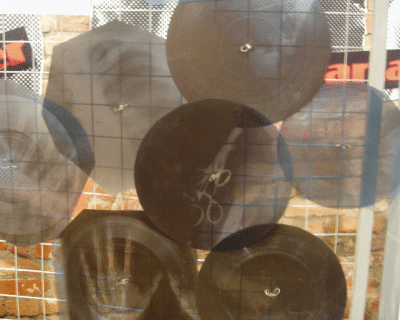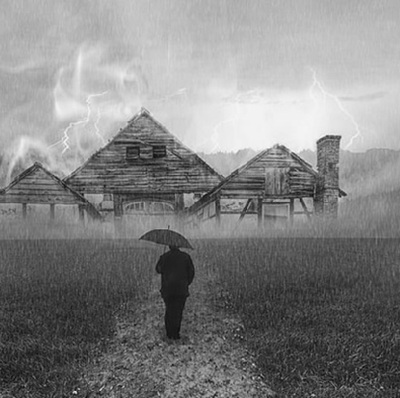.
.
“A Skull on the Moscow Leningrad Sleeper,” a short story by Robert Kibble, was a short-listed entry in our recently concluded 63rd Short Fiction Contest, and is published with the consent of the author.
.
.
___
.
.
Dmitry Rozhkov, CC BY-SA 3.0 , via Wikimedia Commons

“Rock on bones” Gramophone record (USSR, 1950-s)
.
___
.
.
A Skull on the Moscow Leningrad Sleeper
by Robert Kibble
.
…..“Why have we stopped?” Veta folded up the top bunk so Max would be able to sit next to her on the lower bunk, and sat down.
…..“What are you worried about? It’ll be congestion getting into Leningrad. This time of the morning, it often happens.”
…..“What if they…?”
…..“We’ve got nothing to hide, Veta, unless. You didn’t?”
…..The briefest flicker of her eyes up to the briefcase was enough for him to know that yes – she had. He tried to whisper, but the sound came out louder. “What possessed you?”
…..Veta looked out through the tiny crack beneath the near-closed grey blind, noticing it hadn’t been cleaned in a long time. Nor had the tiny table that sat between the bunks piled high with the detritus of the other couple sharing the four-berth cabin, a couple who had briefly disappeared to the dining carriage, presumably to escape the stench of the man’s repeated belching and farting overnight. Not that Veta would have slept anyway.
…..“I had to,” she said, staring now at Max’s feet rather than engage. It was too late to change anything. Where could they go? She leant forward and wrestled with the blind, winning an extra crack of light and a view of train tracks in the orange glow of the dawn.
…..“That stupid…”
…..“…don’t’ say it, Max. Please. I know what you think. I’m sorry. But it’s the one thing I’ve got to remind me.”
…..“You’ve got me, Elizabeta. Don’t I remind you?” He didn’t use her full name unless he was seething inside. He would be wanting to get up and let off steam, even more frustrated that he’d know he couldn’t. He was quick to rile, but quick to recover.
…..“I’m so sorry, Max, but please understand, if I leave it behind then I’m leaving the final thing I own that I care about. I’d be leaving my last memories of my parents. I’d be leaving myself.”
…..“That stupid record.”
…..Veta flashed him a stare, and for once Max looked away. He seemed about to apologise, but instead his shoulders dropped and he sighed.
…..The record was not stupid.
…..That record had cost lives. It might cost theirs if it was found. It sounded stupid, going through her mind, but people had died trying to smuggle books out of the country before, or jewels, not for their monetary value but because of what they represented. Even if things had got a little easier under Kruschev, they weren’t that easy. A record – one thirty-centimetre disk of acetate – was that worth risking themselves for?
…..Yes. Her memory came back. It was. Because even the thought of it now, sitting wrapped in a false compartment of that briefcase up on the luggage rack, specially unwashed clothing packed in nearby as a last resort, under a small pack of illicit cigarettes smuggled through from Mongolia as a decoy – something someone could find and be satisfied fining them for – well, that record brought it all back. Evenings with her father teaching her to dance, her standing on his toes as she learned all the western dances and whooped with joy. Watching her father holding onto her mother, gently gliding around the room, her mother dressing up for the occasion as if it was an event, and the looks on their faces, as if nothing in the world could divide these two. A teacher from Yekaterinburg and a nurse from Moscow, thrown together in the darkest horrors of the war, her bringing him back from the clutches of death, slowly encouraging him to walk again, to teach again, to live and love again. Those had been the best times.
…..And when Max came on the scene, well – he’d met them once before they were taken. That was something. He’d known them once, and they approved. She hadn’t had a chance to discuss when to tell him. You could never tell who was an informant, but she’d understood right from the start, she had to make a choice. Tell him, open up to him, risk it all in him, or keep quiet forever.
…..She’d dived in, completely. She’d sat him down and told him how important it was, and how she trusted him. She’d gone to the table and reached underneath, twisting out the underside and revealing that most prized of possessions. She’d held it up to him.
…..“An x-ray?” he’d said, incredulous that this was worthy of such secrecy.
…..She smiled, and told him to look closer. Closer into the skull with a serious fracture to the left eye socket, closer at the white pencil writing across the middle, ‘The Duke’ with Ellington written in brackets underneath, the ‘t’ hard to read because it fell just across a section of white bone. And then, looking closer still, he made out the grooves running round the record.
…..He looked up, still not understanding.
…..“Mother was a nurse, working in radiology for a while, so she could get the plates. She knew a man who worked on the ships, and he brought in music from America. These plates are the same consistency, so they could press the records onto them. Isn’t it beautiful?”
…..He didn’t seem convinced, so she got up, took the record from him, and put it on her record player, turning the volume down enough that it wouldn’t be overheard, and with a crackle the trumpet began to burst into life. Veta walked back and held out a hand to Max. He stood, and she began swaying back and forth. Slowly he joined in, clumsily following her round the carpet. The memories of her father came flooding back, as she looked up into the eyes of a man she knew she loved already. Completely. If Max was an informant, she’d been so wrong with everything she thought she knew that she didn’t want to live in that world.
…..And now, looking at that same man, seething because she hadn’t parted with that one thing that would remind her of happy times, the only evidence she had of her mother’s existence in the world, she spoke, quietly. “You have to understand. Please. I should have told you. That was wrong. But I couldn’t leave it.”
…..He opened his mouth to speak, just as two officers opened the door, without knocking. As was their way. “Papers,” one said, holding out a hand.
…..Max stood and pulled their papers out from an inside pocket of his jacket. The officer flicked through them. Everything was in order. He had a temporary work assignment in Leningrad. That had been the trigger, of course. An assignment in Leningrad, a carefully-written letter to an old friend who had made it to Finland, and a very long discussion with Max about whether to risk it. He hadn’t been convinced. They had an acceptable life together. Why risk everything? Until one day they came home from work to find their neighbour, the always-there-for-you Tania, replaced by a couple who slammed the door in their face. Not a word as to why. Tania hadn’t done anything, unless you counted keeping quiet if she’d ever heard the music through the wall. It was not knowing that hurt the most, not being able to ask, for fear of the suspicion becoming infectious.
…..The officer said nothing, handing the papers back with a grunt. “Where are they?” he asked, pointing at the pile of bedding on the other bunks.
…..“Dining car I think. They’ve been gone for a while.”
…..The officers nodded to each other, and without asking permission, turned to the luggage racks and began unpacking bags, one unpacking Max and Veta’s, the other on the other side.
…..Veta tried to look away. She knew the officer would turn occasionally to guage her reaction, to see where she was looking. They were trained at that. If someone searched your flat, you chose two or three places and kept switching between them, never even letting your glance slide across to the table with the concealed compartment on the underside containing your one treasure. Only at the regulation set of Soviet-approved records by the player itself.
…..The officer found the cigarettes, looked at them and grunted again, slipping them absent-mindedly into an inner jacket pocket. Were they looking for something specific? Had someone spoken? For a fraction of a second Veta wondered if it was Max. Had he betrayed them? She knew that thought had to be crushed. It would drive her mad. It drove everyone mad in the end. You had to trust. It was how humans worked. Max was a good man, a good man she might end up destroying by her desperate desire to escape, but equally large desire to keep that disk of musical memory with her. She could buy a new copy if she made it out – she knew that – but it wouldn’t be the one her mother had played to her, that her father had danced to, that for all she knew was the reason they had been taken.
…..She struggled to breathe, focusing on in-out, in-out. Her heart rate was rising, and she felt herself flushing. She glanced up at the officer. He was running a finger round the bottom of the case. The stitching there was obvious, if you were really looking. There was no hiding it. Her vision started fading. This was it. This was the moment she destroyed another two lives on a stupid fantasy of being free and being able to play that record louder, loud enough that any neighbour could hear, not afraid to revel in the joyous music and its playful nature. Free to enjoy music. It seemed so small, but so important.
…..“What’s this?”
…..She looked to the floor. They’d been close. An agreed walk outside Leningrad and a boat to meet them. A new life. It had been two days away, with only that walk out to the shore to risk. To come so close and to have it snatched away. She looked up at Max. She wanted to hurl herself into his arms and beg for a forgiveness he ought never to grant, but when she saw him, he was looking unafraid. He looked surprised. A quiet surprise.
…..She followed his gaze. The officer on the other side of the cabin was holding something. A newspaper, not written in Russian. A western alphabet.
…..“Right.” The officer pushed the paper, whatever it was, back in the case, and closed it. “Dining car, you said. Let’s go.”
…..The other – nearer to them – turned and left. No word.
…..Max looked at Veta, then got up and before he put her things back in her case, he ran a finger along the fake seam. He smiled. He closed her case, squatted down in front of her, kissed her, then said “Of course I understand.”
.
.
___
.
.

Robert lives west of London with a wife, a teenage son, and a cornucopia of half-finished writing projects. A few have been published over the years, which – it has to be admitted – is very pleasing. If only a less creative day job wouldn’t keep getting in the way, he’s sure it would be more. You can find him on @r_kibble on Twitter or at www.philosophicalleopard.com,
where you’ll find more short stories, links to his novels, and musings on why zeppelins don’t ply the skies.
.
___
.
.
Click here to read “Company,” Anastasia Jill’s winning story in the 63rd Jerry Jazz Musician Short Fiction Contest
Click here for details about the upcoming 64th Jerry Jazz Musician Short Fiction Contest
Click here to subscribe to the Jerry Jazz Musician quarterly newsletter (it’s free)
Click here to help support the continuing publication of Jerry Jazz Musician, and to keep it commercial and ad-free (thank you!)
.
.
___
.
.
Jerry Jazz Musician…human produced (and AI-free) since 1999
.
.
.














































